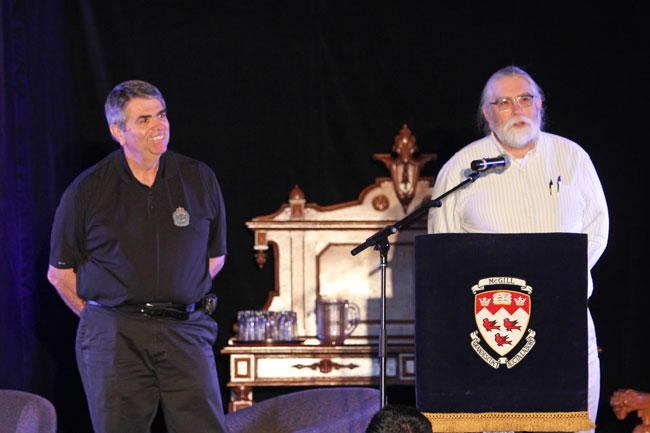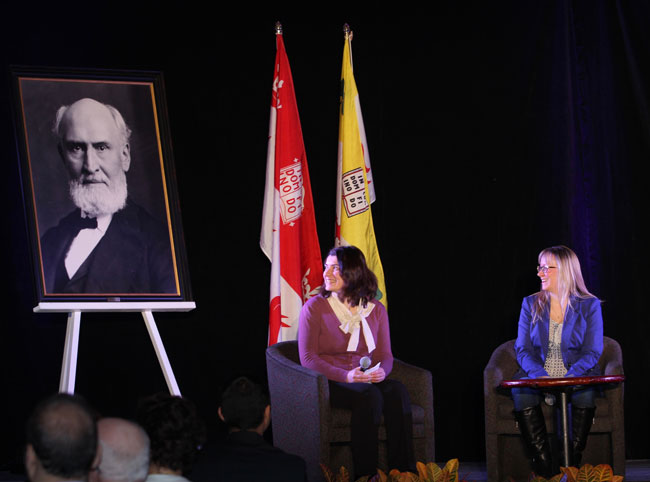
The theme for Macdonald Campus’ Founder’s Day, held on Feb. 9, was Tell Us Your Story. When Anja Geitmann addressed the crowd gathered in the Centennial Centre Ballroom, she said that for the past one-and-a-half years, since becoming Dean of the Faculty of Agricultural and Environmental Sciences (FAES), her story has been “inextricably linked” to Mac’s story.
“Obviously,” she said, “I have to start with the story of Sir William Macdonald.”
Geitmann reminded people that while Founder’s Day always falls on the Thursday closest to the anniversary of Sir William’s birth on February 10, 1831, this year was special because it marked 100 years since Mac’s great benefactor passed away. “It has been 100 years since Macdonald has seen this campus,” said Geitmann. “A lot has happened here.”
Founded in 1907, as Macdonald College, the Faculty of Agricultural and Environmental Sciences has developed into a world leader in the fields of food, nutrition and health, agriculture, biodiversity, applied biosciences, climate change and the environment.
Physically, Mac has grown considerably since its early days, and the 650-hectare campus represents the largest green space on the island of Montreal. Mac’s extensive collections and ecological assets include the Macdonald Campus Farm; the Morgan Arboretum; and the forests, marshes and wetlands of the Molson Nature Reserve.
But, said Geitmann, the driving forces behind all this progress, are the same tenets embraced by Sir William all those years ago.

“What we really try to do [in FAES] is to provide an education that goes beyond the classroom; that is an education that has tangible results; that gets people into the fields, onto machines and into other countries,” said Geitmann. “But that is nothing new. Between the two of them [Sir William Macdonald and Mac’s first principal, James Wilson Robertson], they already knew how important it was to learn by doing.
“This concept of teaching manual skills is something we’re still doing,” continued Geitmann. “Of course, we are doing cutting-edge science – but we’re also going out into the field and applying it.”
Geitmann also spoke of another common thread that has been running through Mac since its inception. “The source of inspiration has really been the same for the past 100 years – that inspiration comes simply from the people,” said the Dean, noting that the passion exhibited by students, staff, faculty and Mac alumni is extremely motivating. “All the creative ideas that come into my mailbox every single day are truly inspiring,” she said.
It’s all about the people
Not surprisingly, the rest of Founder’s Day celebrations followed the Dean’s lead, highlighting the talented people of Mac – students, staff and faculty.

Three new Mac professors – Jennifer Ronholm, Nicoletta Uzea and Saji George – took the stage to take part in a slideshow quiz that introduced them to the community in a lighthearted way. Murray Humphries, Director of the Center for Indigenous Peoples’ Nutrition and Environment and award-winning researcher, proved he also has pretty good standup chops as he welcomed the trio with some good-natured grilling.
Michel Massé, Logistics and Macdonald Campus Operations, was presented with the Macdonald Campus Award of Excellence for Administrative and Support Staff. “One of the functions that Mike does for us [at the Institute of Parasitology] is to make sure we work in a clean and healthy environment,” said Tim Geary, Canada Research Chair in Parasite Biotechnology. “But way more important than that is what Michel contributes to the spirit – the joie de vivre – of the Institute.
“Mike is an exceptionally smart guy and he has a terrific sense of humour,” continued Geary. “He is a friend and a mentor to the students. He is my friend… His presence makes the Institute a better place.”
Celebrating exceptional students
Next up, the three winners of the Lister Family Engaged Science Initiative 3-Minute Thesis competition presented their research to the audience in a mere 180 seconds.
Competition winner Mariam Saad, MSc candidate in the Department of Natural Resources, spoke about strategies to improve the detection of Legionella, an infectious pathogen that causes life-threatening pneumonia.
Second place finisher Salam Habib, PhD candidate at the School of Dietetics and Human Nutrition, discussed controlling and reshaping the gut bacteria in an effort to reduce the epidemic of obesity and the related disorders.
Finally, third place finisher Mi Lin, PhD candidate in the Department of Natural Resources, presented her research exploring the innovative ways to quantify groundwater change and examine its relations to water cycle, climate change and anthropogenic activities.
Exceptional Mac students were also celebrated during the presentation of the 2017 Gold Key Awards. Given by the Macdonald Branch of the McGill Alumni Association, the Gold Key Award is presented to students in recognition of their outstanding contribution to extra-curricular activities at the Macdonald Campus. This year’s recipients were:
- Mark Remo Cool, Bioresource Engineering
- Divya Gupta, PhD candidate, Bioresource Engineering
- Christine Ha, Nutritional Sciences (Global Nutrition)
- Mark Kaji, PhD candidate, Institute of Parasitology
- Ruojun June Liu, Nutritional Sciences (Dietetics)
- Craig Waddell, Farm Management and Technology
